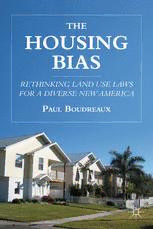
The Housing Bias: Rethinking Land Use Laws for a Diverse New America PDF
Preview The Housing Bias: Rethinking Land Use Laws for a Diverse New America
The Housing Bias The Housing Bias Rethinking Land Use Laws for a Diverse New America Paul Boudreaux Palgrave macmillan THEHOUSINGBIAS Copyright©PaulBoudreaux,2011. Softcover reprint of the hardcover 1st edition 2011 978-0-230-11050-2 Allrightsreserved. Firstpublishedin2011by PALGRAVEMACMILLAN® intheUnitedStates—adivisionofSt.Martin’sPressLLC, 175FifthAvenue,NewYork,NY10010. WherethisbookisdistributedintheUK,EuropeandtherestoftheWorld, thisisbyPalgraveMacmillan,adivisionofMacmillanPublishersLimited, registeredinEngland,companynumber785998,ofHoundmills, Basingstoke,HampshireRG216XS. PalgraveMacmillanistheglobalacademicimprintoftheabove companiesandhascompaniesandrepresentativesthroughouttheworld. Palgrave®andMacmillan®areregisteredtrademarksintheUnited States,theUnitedKingdom,Europeandothercountries. ISBN978-1-349-29295-0 ISBN978-0-230-11985-7(eBook) DOI10.1057/9780230119857 LibraryofCongressCataloging-in-PublicationDataisavailablefromthe LibraryofCongress. AcataloguerecordofthebookisavailablefromtheBritishLibrary. DesignbyIntegraSoftwareServices Firstedition:August2011 10 9 8 7 6 5 4 3 2 1 Transferred to Digital Printing in 2012 ForLisa Contents Acknowledgments ix Introduction:TheHousingBias:TheLastPrivilegeofAffluent Americans 1 1 TheThirdBattleofManassas 11 2 PublicUsesandAbuses:EminentDomaininandaroundthe EmpireState 61 3 SideTrip:MountLaurelandtheFairShare 103 4 GuardingtheRuralMythinMichigan 117 5 FillingintheWorld’sBiggestSuburb:LosAngeles 147 6 Conclusion:OvercomingtheHousingBiasfor Twenty-First-CenturyAmerica 177 Bibliography 201 Index 211 Acknowledgments IthankStetsonUniversityCollegeofLawandDeanDarbyDickersonfor theawardoftheLeRoyHighbaughSr.ResearchChairfor2009and2010, whichenabledmetoresearchthisbook.StetsonstudentsCrystalRoznick, Julia McKee, Leah Cheli, and Adam Hynick provided valuable research assistance. I also thank my editors at Palgrave Macmillan, Robyn Curtis, SamanthaHaseyandHeatherFaulls,FloraKensonatIntegraSoftwareSer- vices,andStetsonparalegalDianneOeste,fortheirworkonmydraftsand gettingtheworkintoprint. Introduction The Housing Bias: The Last Privilege of Affluent Americans This is a book of real-life stories about how local laws shape the communitiesinwhichwelive.Ittravelsfromarecentlyboomingsub- urbinVirginia,toabigdevelopmentprojectinNewYorkCity,totherural outskirtsofametroareainMichigan,andtothebusyresidentialstreetsof California,withotherstopsalongtheway.Inparticular,thebookexplores theargumentthatthelawsthatgovernouruseoflandarebiasedinfavorof onespecificgroupofAmericans—affluent,home-owningfamilies—who leastneedthegovernment’shelp,andthatnewcomers,elderlypeople,and modest-incomefamiliesbearthecostsofthishousingbias. WhomShouldGovernmentHelp? Overthepastseveraldecades,weAmericanshavecometothinkofgovern- mentasaforcethathelpsthelessfortunateinsociety.Ourpublicdebates usuallyrevolvearoundwhetherandhowtoassistthevulnerable—around issuessuchaspublic-fundedhealthcareforthepoorandelderly,antidis- criminationlawstosupportracialminorities,andpollutionrulestolimit injuries to the most susceptible in our communities. Advocates for these “socialjustice”policiesarguethatthegovernmentofawealthyandsophis- ticatednationcanandshouldhelpthosewhofacegreatdifficultiesinlife, oftenthroughnofaultoftheirown.Ontheotherside,opponentsof“big government”arguewithequalvigorthatmeddlingwiththeprivatemarket forgoodsandservicesoftendoesmoreharmthangood,inthatitdraws resourcesawayfromprofitableendeavorsandsubsidizesmediocrity. Smart thinkers on both sides recognize that their opponents some- times make valid points. Honest environmentalists recognize that tighter lawsonairqualityarelikelytocausesomebusinessestoconsidermoving 2 THEHOUSINGBIAS theiroperationsoverseas.It’sjustthatthebenefitsofcleanerairforevery- one outweigh this drawback, they argue. Likewise, honest opponents of government-fundedhealthcareknowthatitwouldhelpsomehardwork- ingAmericanswhodon’thaveemployer-sponsoredinsurance.It’sjustthat thecosttothetaxpayerandtheskewingofthecomplexmarketforhealth servicesaren’tworthit,thelibertarianssay. Eachpublicprogram,however,isintended,atleastonitsface,toassist themorevulnerablepeopleinAmerica.Richpeople,healthypeople,and whiteheteromaleswithsuccessfulcareersaren’ttheoneswhotypicallyask morefromgovernment.Theylooktogovernmentonlyformeatandpota- toesbasics,suchasprotectionfromcrimeandfire,decentpublicschools, andsecurityagainstpotentialterrorists—thingsthateverybodywants.All inall,theyseeknothingspecial.Except,aswewillsee,inlanduselaw. PrivilegesfortheAffluent:AHistoricalBackdrop Itwasn’talwaysthisway.Ashorthistoryofprivilegeisagoodplacetostart. Manyhistorianssaythatthe“modernworld”beganalittlemorethan200 years ago, with the American and French Revolutions of the late 1700s. In the pre-revolutionary France of the King Louises, many citizens— especially middle-class people—seethed over a legal system based on the conceptofprivilege.Thisseeminglyinnocentwordmeantmorebackthen thanitdoestoday.Itmeantthatnobles—speciallyrecognizedfamilieswho madeupatmost1percentofthepopulation—wereentitledtolegalrights thatweren’tenjoyedbytheremaining99percent.Forthemostpart,rights weren’tthingsthatyouheldbecauseyouwereacitizen,orevenahuman being, but were benefits that you enjoyed through your membership in agroup.Itwasn’twhatyoudid;itwashowyouwereborn.Ifyouwerea luckynobleman,youhadalotofprivileges—suchastherighttocarrya sword in public (no universal right to bear arms back then), the right to have one’s chapel draped in black at a family funeral, and, most impor- tantly, the right to be exempt from the big property tax, which was the government’s(meaningtheking’s)chiefsourceofrevenue. ItmightseembizarretomodernAmericansthatthenobleswhocon- trolled lands would be exempt from this tax, called the taille, while poor farmingtenantshadtopaytaxonthelandsthattheymerelyrented.After all, in today’s society, the rich pay the bulk of the income and property taxes, while the poor often pay little or nothing. But the notion of privi- legecarvedoutaspecialplaceforthenobles.Theywererequiredtoserve thekingasaidesandsoldiersintimesofwar,forexample.Theyalsohad somespecialduties(notmuch)tohelptheirtenants.Inreturn,theyheld INTRODUCTION 3 thegreatprivilegeofexemptionfromthepropertytax.However,asKing LouistheSixteenthincreasedthetaxtopayforhiswardebts(andtheking had also often sold noble titles to help further reduce his deficit), those who weren’t privileged saw the rules of privilege as the essence of injus- tice. The privileges of nobility were like “those vegetable tumors which live only from the sap of the plant that they suck dry,” wrote a radical priest, Emmanuel-Joseph Sieyès. He became one of the guiding lights of the French revolutionaries, who had as one of their most essential goals (evenmoreimportantthanchoppingofftheking’shead)theabolitionof alltypesofprivilege. It was in this political climate that the American form of government took shape under the federal Constitution, drafted in 1787 and molded byourpresidents,Congress,andcourtsoverthenextfewdecades.Lead- ers such as Thomas Jefferson (who personally didn’t have much to do with writing the details of the Constitution, because he was serving— andpartying—asambassadorinParisatthetime)hadprivilegeforemost in their minds when they crafted a new form of republican and demo- craticgovernment.RevolutionariessuchasJeffersonandhisprotégéJames Madison ensured that traditional privilege wouldn’t raise its head in the Americansystem.OneofthefirstthingsthattheConstitution’sdraftersdid wastomakesurethat“NotitleofnobilityshallbegrantedbytheUnited States.”(It’sinArticleI,section9oftheConstitution.)Otherwise,wemight havehadmembersoftheKennedyorBushfamiliesliterally“lording”over us as the Duke of Cape Cod or the Earl of Amarillo. The American and FrenchRevolutionsdidn’twipeawayentirelytheconceptofprivilegeinthe Westernworld—acoupleofdecadesaftertheFrenchRevolution,amiddle- agedmusicianinAustrianamedLudwigvanBeethovenhadhislawsuitfor custodyofanorphanednephewtossedoutofthespecialcourtreservedfor nobleswhenthejudgesdiscoveredthattheDutch“van”didn’tautomati- callymeanthathewasanoble,asdidtheGerman“von”—butAmericans didn’twantitinthenewworld. Intheearlydecadesofthenewcountry,Americanscontinuedtoargue over the appropriate role for government. On one side was Alexander Hamilton, a financial whiz and former aide to George Washington, who helpeddrafttheConstitutionandlaterdrummedupsupportforitsrati- fication. He strove to mold the ragtag confederation of little states into a solidnationthatcouldholdup—economicallyandmilitary—againstthe powerful nations of Europe. Born out of wedlock to a poor girl in the West Indies, Hamilton struggled for success in life, and he feared that a looselytiedUnitedStateswouldflounderinaworldfraughtwithdangers. “Thecountryhasagallopingconsumption,”hewarnedtheleadersofthe new confederation, “I have a powerful remedy for this problem—strong
